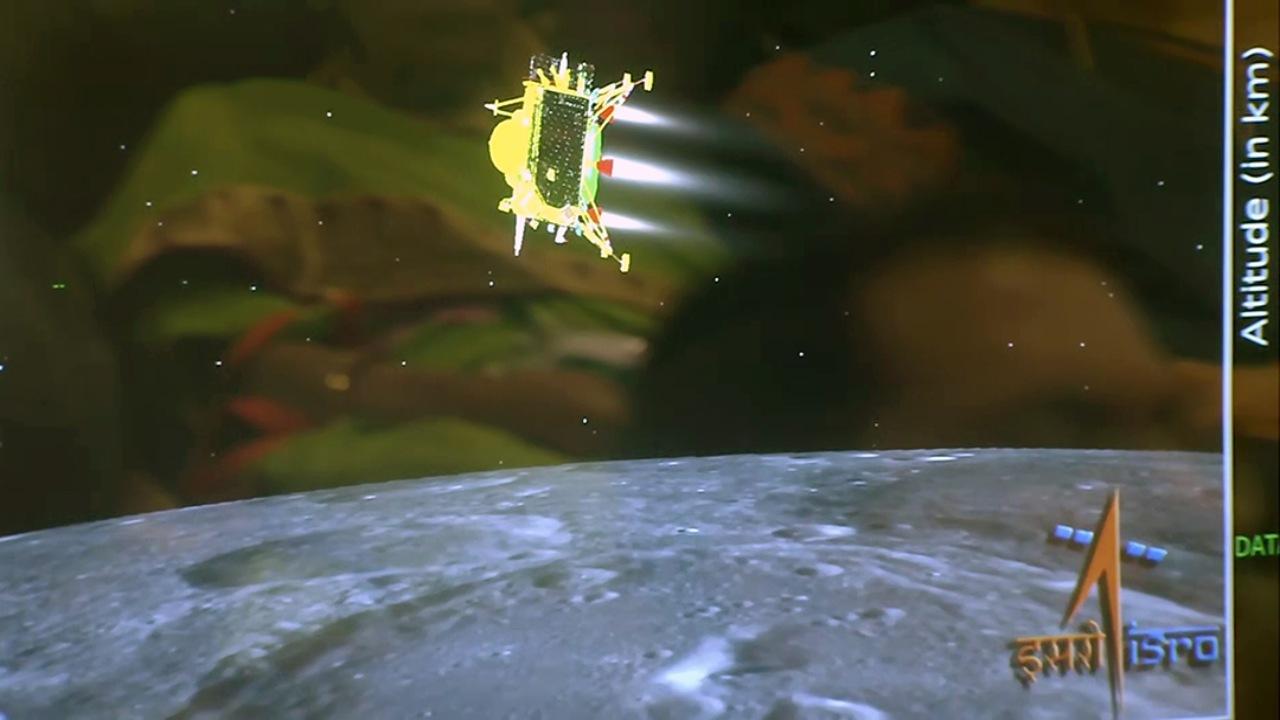The Lander Module (LM) of the Indian Space Research Organisation’s (ISRO) third lunar mission Chandrayaan-3, launched on July 14, has successfully landed on Moon. The LM is propelling towards the moon surface in the intended trajectory

Chandrayaan-3 Mission: A view of the Chandrayaan-3 lander Vikram to touchdown on the Moon's South Pole, on Wednesday. ANI Photo
The Lander Module (LM) of the Indian Space Research Organisation’s (ISRO) third lunar mission Chandrayaan-3, launched on July 14, has successfully landed on Moon. The LM is propelling towards the moon surface in the intended trajectory, the space organisation said.
ADVERTISEMENT
The successful landing of the Lander Module on the Moon's surface is a significant achievement.
The ISRO has been actively sharing updates on the mission's progress through social media, indicating that the systems are undergoing regular checks and that everything is proceeding as scheduled. The organization's Mission Operations Complex (MOX) is described as being full of energy and excitement, which is not surprising given the anticipation surrounding such a significant lunar mission.
Prime Minister Narendra Modi congratulated Indian Space Research Organisation for the success of lunar mission.
"Historic day for India's space sector. Congratulations to @isro for the remarkable success of Chandrayaan-3 lunar mission," the PM tweeted.
Historic day for India's space sector. Congratulations to @isro for the remarkable success of Chandrayaan-3 lunar mission. https://t.co/F1UrgJklfp
— Narendra Modi (@narendramodi) August 23, 2023
On August 18, the ISRO successfully performed the first deboosting operation that reduced its orbit to 113 km x 157 km. This was performed the day after the lander module separated from the propulsion module after a 34-day-long journey towards the Moon. On August 20, the ISRO performed the second and final deebost of the Lander Module to reduce the Lander Module to 25 km x 134 km.
Lander, with Rover in its belly, is in 25 km x 134 km orbit. It is set to land on the Moon on August 23 around 6.04 p.m. IST. Powered descent is expected to commence around 5.45 p.m.
A day before the crucial soft landing of the Chandrayaan-3 Lander Module on the Moon surface, the Indian Space Research Organisation (ISRO) said that the mission is on schedule. “The mission is on schedule. Systems are undergoing regular checks. Smooth sailing is continuing. The Mission Operations Complex (MOX) is buzzed with energy & excitement!” the ISRO posted on social media platform X (formerly Twitter).
Here's a breakdown of the key details about Chandrayaan-3:
The Chandrayaan-3 landing module is anticipated to touch down on the moon's surface at 8:34 a.m. Eastern time on Wednesday (6:04 p.m. in India).
Presently, the lander is in an elliptical orbit around the moon, coming as close as roughly 15 miles above the lunar surface. At approximately 8:14 a.m. Eastern time on Wednesday, the spacecraft will ignite its engines to exit its orbit and commence a descent towards the surface. The engines will also help control its descent for a gentle landing.
The Indian Space Research Organization (ISRO), responsible for the nation's space program, will offer a live broadcast from the mission control room in Bengaluru. The live stream will be available on ISRO's YouTube channel and website, starting at 7:50 a.m. Eastern time.
The term "Chandrayaan" translates to "moon craft" in Hindi. Aside from the propulsion module that placed the spacecraft in lunar orbit, the landing module comprises the Vikram lander and the Pragyan rover, both aimed at landing in the moon's south polar region. This is an unmanned mission; no astronauts are on board.
The chosen landing date of August 23 aligns with the sunrise at the landing site. The mission is set to conclude two weeks later, coinciding with sunset. While on the moon's surface, the solar-powered lander and rover will employ various instruments to conduct measurements related to thermal, seismic, and mineralogical aspects.
Here are other details of the landing:
India's Chandrayaan-3 is an uncrewed lunar exploration mission aimed at achieving a successful landing on the moon's surface.
The mission follows India's previous attempt, Chandrayaan-2, which ended in a crash almost four years ago.
The landing is significant because it targets an area of the moon's southern pole that hasn't been explored before.
The landing module consists of the Vikram lander and the Pragyan rover, both of which are designed for exploring the moon's south polar region.
Chandrayaan-3's success takes on added importance due to a recent failed lunar landing attempt by Russia's Luna-25 mission.
India's space program is a source of national pride and reflects the country's ambitions as a rising geopolitical power.
The mission's success would make India the fourth country to achieve a moon landing, after the United States, Soviet Union, and China.
India's space exploration efforts align with its diplomatic push for a leadership role on the global stage, and successful missions bolster its image as a technological powerhouse.
 Subscribe today by clicking the link and stay updated with the latest news!" Click here!
Subscribe today by clicking the link and stay updated with the latest news!" Click here!







